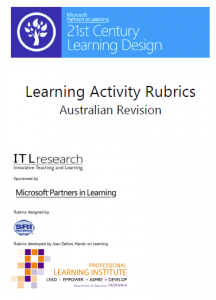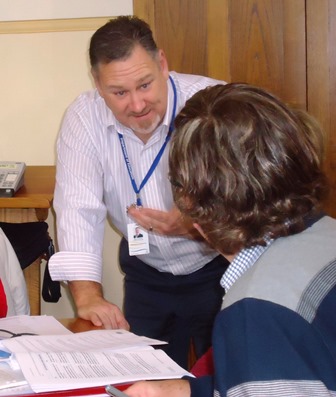Professional Learning and the 21CLD framework – some emerging data.
Lists defining, academically and anecdotally, 21st century skills, abound. One of the programs I facilitate for the Tasmanian Professional Learning Institute revolves around using the 21st Century Learning Design (21CLD) framework. Over the last 18 months, I have had the opportunity to work with around 70 teachers from 30 schools.
 21CLD names up six capabilities: Collaboration, Knowledge Construction, Self-regulation, Real World Problem Solving and Innovation, Use of ICT for learning and Skilful Communication. The original global rubrics that support and define these capabilities have been critically refined and aligned to Australian context and Curriculum. The rubrics make absolutely concrete, at classroom level, the ways of thinking and working that enable teachers to construct learning activities that provide students maximum opportunities to build the six “21st Century” capabilities.
21CLD names up six capabilities: Collaboration, Knowledge Construction, Self-regulation, Real World Problem Solving and Innovation, Use of ICT for learning and Skilful Communication. The original global rubrics that support and define these capabilities have been critically refined and aligned to Australian context and Curriculum. The rubrics make absolutely concrete, at classroom level, the ways of thinking and working that enable teachers to construct learning activities that provide students maximum opportunities to build the six “21st Century” capabilities.
So does using the 21CLD framework have an impact?
Emerging evidences; 47 responses to evaluative feedback, gathered over three 21CLD programs, would indicate a resounding YES.
As a result of 2 full day workshops, preceded by several webinars, and subsequent in-school support, we are seeing consistent indications of shift in practice across participants’ knowledge, attitudes, skills, aspirations and behaviours. Participant schools are beginning to develop a common language and shared understandings of what the six capabilities look like on the ground; in terms of both learning activity design and student learning behaviours.
Pre and Post workshop ratings against the National Professional Standards for Teachers also generally indicate a significant growth in professional capacity.
This document (pdf 386kb) contains an indicative sample of our program evaluation and emerging evidences – please get in touch if you are interested in finding out more!

